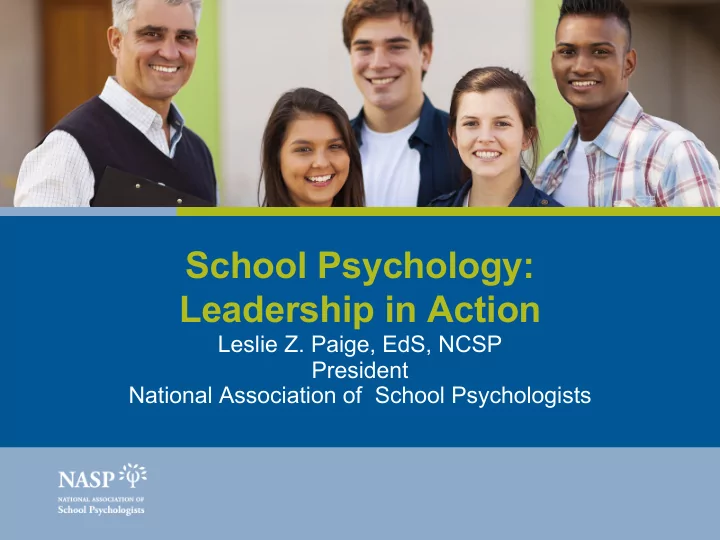

What would you consider to be the top 5 areas and situations where leadership is expected from school psychologists? Harding 2014 Shriberg 2010 Special Education Classroom/academic eligibility interventions Assessment Behavioral interventions Behavioral interventions Crisis intervention Knowledge of special Knowledge of special education laws education laws/processes Academic interventions Assessment /evaluations 57
Implications from Shriberg Study • Focus on improving outcomes for students, families, schools and communities • Leadership is multifaceted • Competence • Knowledge • Interpersonal skill • Character • Leadership is something we all can achieve 58
Definitions of school psychology leader • Facilitates change, promotes positive outcomes/success (52.3%) • Competence (27/5%) • Vision/big picture view (27.5) • Works effectively in teams/collaboration (27.5%) • Influences others/persuasive 23.5% Shriberg, et al 2010 59
60
Perceptions of Leadership School psychologists see themselves: • Transformational • Active leaders • Value based models • Effective at meeting needs and representing others • BUT……. Augustyniak and Privitera (2016 ) 61
What makes an effective leader? •Model the way •Inspire a shared vision •Challenge the process •Enable others to act •Encourage the heart The 5 Practices of Exemplary Leadership (Kouzes & Posner 2012) 62
Build Your Leadership Reputation • Demonstrate your value • Get to know leaders with expertise. • Build relationships with influential decision makers. • Be professional • Be serious when it is time to be serious, and fun when it is time to have fun! 63
2 Laws of Leadership Kouzes & Posner 64
Power and leadership • Position • Personal • Referent • Expert • Informational French & Raven (1959) 65
66
67
Distributed Leadership • Leadership is a shared effort by more than one person • Collective expertise & responsibility • Not an activity, but a procedure • Individuals could be leaders (or followers) in one situation but not another 68
School psychologists are leaders • Key roles on school leadership teams • Behavioral & academic consultation • Crisis intervention & school violence prevention • Professional & interpersonal competencies to work effectively across internal and external boundaries • Build commitment in diverse groups over which school psychologist has no real authority and whose views may be very different than own 69
School Psychologists as Leaders • Unique training • Connect with adults and students • Lead from the middle We already are leaders 70
Leading from the middle • Most school psychologists are in the middle of the organization • Not entry level but limited authority • Lead through the connections we make within the system 71
72
Leadership Challenges for School Psychologists • Managing high levels of responsibility • Managing interpersonal boundaries • Dealing with diversity 73
Active Leadership Development •Strategic thinking •Understanding perspectives of others •Dealing with conflict •Persevering through adversity or resistance •Recognizing & seizing leadership opportunities (McCauley, 2001) 74
Implications for Graduate Programs • Leadership theory • Interpersonal skills • School context • Leadership identity development • Field placement considerations Augustyniak 2014 75
Getting Involved 76
State and National Leadership • Not “leaders” because elected to a specific office • People are recognized as leaders because of their behavior • Chart a path for others • Inspire others to follow 77
How can I get involved? • State association for school psychology and affiliated groups need volunteer leaders! • State associations have access to support • Regional Leadership Meetings • Assistance to States • NASP website 78
Getting involved with NASP contact Leadership Development Committee Hiral Vekaria, Chair hiral.bhatt03@gmail.com 79
Advocacy “Unless someone like you cares a whole awful lot, nothing is going to get better. It’s not.”
Advocacy • Understand the issue and the contributing factors • Call to action 81
“Never doubt that a small group of thoughtful, committed citizens can change the world. Indeed, it is the only thing that ever has.” - Margaret Mead
Advocacy Process • Identify problem • Propose solution • Know your audience • Use effective strategies 83
Advocacy Strategies • Letters and emails • Telephone • Personal visit • Town hall or board meeting 84
#NASPadvocates Advocacy: Make Your Voice Heard! Advocate through the Get informed on the latest Utilize NASP resources to federal policy updates and inform key stakeholders of NASP Advocacy Action advocacy initiatives from the opportunities presented by Center. Policy Matters blog. ESSA. Share updates, resources, and more with #NASPadvocates
NASP Advocacy Voice Developing useful member resources NEW! • Overview of public policy & professional advocacy • Tips/ guidance on how to advocate • Key messages and research on priority issues • Sample resources https://www.nasponline.org/research-and-policy
Advocacy • Shortages • Practice Model • School Safety • Mental and Behavioral Health • Social Justice What is your passion? What do your schools need? 88
Getting a seat at the table 89 Outlander
You are a school counselor, right? 90
91
92
93
NASP Exposure Project • Targets high school & undergraduate students • All materials available • https://www.dropbox.com/sh/4wxvv5w1vw oh8im/AAAoXDzDH0ipgiejYxT5YWLra?dl= 0 #NASPExposureProject #NASPEP #NASPAdvocates #DiversityMatters #RepresentationMatters #SP4SJ 94
95
96
You are central to NASP’s Vision that: All children and youth access the learning, behavior, and mental health support needed to thrive in school, at home, and throughout life and to Core Purpose to: empower school psychologists to promote the learning, behavior, and mental health of all children and youth. 97
Because…. • What you do matters • What WE do ultimately benefits children 98
Some people make things happen. Some people watch things happen. And then there are those who wonder, What the hell just happened. Carroll Bryant 99
Resources Augustyniak, K.M.(2014).Identifying and cultivating leadership potential in school psychology: A conceptual framework. Psychology in the Schools,51(1), 15-31. Augustyniak, K.M. (2016). Perceptions of leadership practices of school psychologists: Views of multiple stakeholders. School Psychology Forum,10(4), 371-385. Burns,M.K.,Preast,J.L.,Kilpatrick,K.D., Taylor,.N., Young,H., Aguilar, L.,Allen,A.,Copeland,C.,Haidar, A.,& Henry,L. (2017). Leadership theory for school psychologists: Leading for systems change. Communique´46(2), 30-31. Enz, A. & McCullum, C.(2018). Securing a (New) seat at the table: Distributed Leadership and School Psychologists. Communique´ 46(6), 12-14. Shriberg, D., Satchwell,M., McArdle,L.,&James,J.M.(2010). School Psychology Forum 4(4), 8-21. 100
Recommend
More recommend